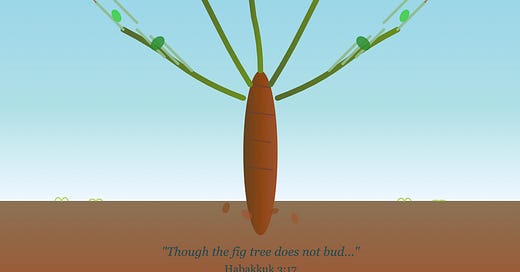"Though the fig tree does not bud and there are no grapes on the vines, though the olive crop fails and the fields produce no food, though there are no sheep in the pen and no cattle in the stalls, yet I will rejoice in the Lord, I will be joyful in God my Savior." - Habakkuk 3:17-18
I've read this verse so many of times over the years, but it never really stuck before. Recently a friend lost his job, his health insurance, and his sense of purpose all in the same week. At 62, he's wondering if anyone will hire him again.
"How do I rejoice in this?" he asked me. "How do I find joy when everything is falling apart?"
It's the question Habakkuk wrestled with thousands of years ago, and somehow his ancient words speak directly into our modern anxieties.
Here's what I find remarkable about this passage: Habakkuk isn't writing from his comfortable study after a good meal. He's staring at complete economic collapse. In his agricultural society, failed crops meant famine. No livestock meant no income, no food, no future. This wasn't temporary inconvenience—this was devastation.
Yet somehow, in the middle of listing every possible disaster, he pivots to joy. Not happiness—joy. There's a difference.
Happiness depends on circumstances. Joy transcends them.
What strikes me about Habakkuk's declaration is how specific he gets about the problems. He doesn't use vague spiritual language like "even in hard times." He lists the failures one by one: fig trees, grapevines, olive crops, fields, sheep, cattle. Everything that represented security and provision—gone.
I think there's wisdom in being that specific. Sometimes we need to name our actual fears before we can move past them. What about you? What are your fig trees that aren't budding? What are the cattle missing from your stalls?
For my friend, it's the job applications that go unanswered, the retirement account that keeps shrinking, the worried look in his wife's eyes. For others, it might be the marriage that's falling apart, the diagnosis that changes everything, the kids who've walked away from faith.
Habakkuk shows us that authentic faith doesn't require us to pretend these things don't matter. They do matter. The losses are real. The fear is legitimate.
But then comes the "yet."
"Yet I will rejoice in the Lord."
That little word "yet" carries a lot of weight. It's not "because"—Habakkuk isn't rejoicing because of his circumstances. It's not "when"—he's not waiting for things to improve. It's "yet"—in spite of everything falling apart.
This isn't denial. This is someone who has discovered that his joy isn't dependent on his circumstances because his God isn't limited by his circumstances.
I've been learning this slowly and sometimes painfully over the years of my life., My joy can't depend on my work, my kids' choices, my health reports, or my ministry. Not because these things don't matter, but because my God is bigger than all of them combined.
Last week, my friend called with an update. Still no job prospects. Still worried about the future. But something had shifted.
"I'm starting to see this as an opportunity to trust God in ways I never had to before," he said. "When everything was going well, I thought I was trusting Him, but really I was trusting my salary and my benefits. Now I get to find out what it means to trust Him when I have nothing else."
That's Habakkuk-level faith—finding joy not in what God gives, but in who God is.
The fig trees in your life might not be budding right now. The cattle might be missing from your stalls. But joy isn't found in the harvest—it's found in the Harvester.
Even when everything falls apart, He remains.
Sharing: What "fig trees" in your life aren't budding right now? How are you learning to find joy in God Himself rather than His gifts? Share your thoughts below.





